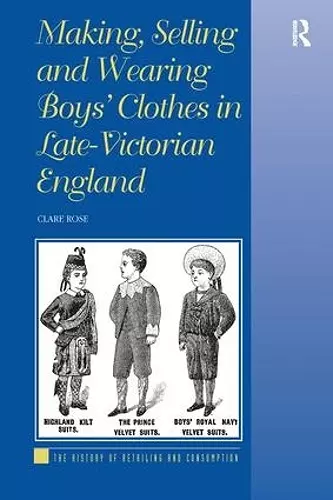Making, Selling and Wearing Boys' Clothes in Late-Victorian England
Format:Hardback
Publisher:Taylor & Francis Ltd
Published:28th Sep '10
Currently unavailable, and unfortunately no date known when it will be back
This hardback is available in another edition too:
- Paperback£52.99(9781138261860)

There has been a great deal of recent interest in masculine clothing, examining both its production and consumption, and the ways in which it was used to create individual identities and to build businesses, from 1850 onwards. Drawing upon a wide range of sources this book studies the interaction between producers and consumers at a key period in the development of the ready-made clothing industry. It also shows that many innovations in advertising clothing, usually considered to have been developed in America, had earlier British precedents. To counter the lack of documentary evidence that has hitherto hampered research into the dress practices of non-elite groups, this book utilises thousands of unpublished visual documents. These include hundreds of manufacturers' designs, which underline an unexpected degree of investment by manufacturers in boys' clothing, and which was matched by heavy investment in advertising, with thousands of images of boys' clothing for shop catalogues in the Stationers' Hall copyright archive. Another key source is the archives of Dr Barnardo's Homes. This extraordinary collection contains over 15,000 documented photographs of boys entering between 1875 and 1900, allowing us to look beyond official polarization of 'raggedness' and 'respectability' used by charities and social reformers of all stripes and to establish the clothing that was actually worn by a large sample of boys. A close analysis of 1,800 images reveals that even when families were impoverished, they strove to present their boys in ways that reflected their position in the family group and in society. By drawing on these visual sources, and linking the design and retailing of boys' clothing with social, cultural and economic issues, this book shows that an understanding of the production and consumption of the boys clothing is central to debates on the growth of the consumer society, the development of mass-market fashion, and concepts of childhood and masculinity.
'Making, Selling and Wearing Boys' Clothes is a significant contribution to the history of the material culture of childhood and the study of the production, marketing and consumption of clothing in nineteenth-century Britain. Clare Rose brings to the subject her meticulous attention to object-based and archival research and a rigorous engagement with theoretical and historiographical debates. It is a book that social, economic, cultural and dress historians will need to read.' Christopher Breward, Head of Research, Victoria & Albert Museum, London, UK
'Drawing on an impressive range of research, and making innovative use of visual data, not least from Barnardo’s archive, Clare Rose’s book is a compelling contribution to the history of consumption, and full of rich and unexpected findings. Broad in scope, the book explores the links between consumption and imperialism, household economics, gender, and childhood and adolescence. It will be essential reading for anyone interested in late-Victorian England, and has many resonances for twenty-first-century debates about children and the consumer market.' Hugh Cunningham, Professor of Social History, University of Kent, UK
'... Making, Selling and Wearing Boys' Clothes in Late-Victorian England has to be one of the most significant pieces of costume research undertaken in recent years and is likely to be of interest not only to costume and childhood historians, but to those researching gender studies, consumerism and the growth of commercial production of clothing in the nineteenth century.' Journal of Childhood in the Past
'It is this book's considerable achievement that it sheds light on aspects of design, retailing and consumption that may have been widely understood by contemporaries, but seem baffling today. Rose's work thus contributes not only to the history of retailing and consumption, but also leads the way in the use of sources such as copyright registrations, photographs or surviving garments that are eloquent on those very issues that are rarely verbalised in conventional archival records.' Business History
ISBN: 9780754664444
Dimensions: unknown
Weight: 453g
294 pages